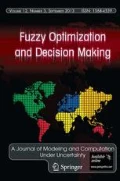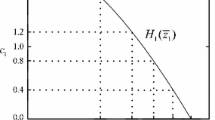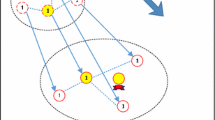Abstract
This paper investigates a novel job search problem in a hybrid uncertain environment. Hybrid uncertainty consists of the randomness in search process and the fuzziness of offered wage. The expected value criterion and the risk tolerance criterion are designed for the job searcher to accept or reject the job offer. Under these two criteria, computing formulas to calculate the expected return of the job searcher are presented. Simultaneously, the average search times and the average chances that search returns exceed reservation wages are provided. Finally, a numerical example is given to illustrate the relationships between the expected returns of the job searcher under two criteria, and the relationships between two average chances as well.
Similar content being viewed by others
References
Batabyal, A. A., & Beladi, H. (2011). A stochastic dynamic programming approach to decision making in arranged marriages. Applied Mathematics Letters, 24(12), 2197–2200.
Huang, T., Zhao, R. Q., & Tang, W. S. (2009). Risk model with fuzzy random individual claim amount. European Journal of Operational Research, 192(3), 879–890.
Jovanovic, B. (1979). Job-matching and the theory of turnover. Journal of Political Economy, 87(5), 972–990.
Liu, B. (2002). Theory and practice of uncertain programming. Heidelberg, Germany: Physica-Verlag.
Liu, B., & Liu, Y. K. (2002). Expected value of fuzzy variable and fuzzy expected value models. IEEE Transactions on Fuzzy Systems, 10, 445–450.
Liu, Y. K., & Liu, B. (2003). Fuzzy random variables: A scalar expected value operator. Fuzzy Optimization and Decision Making, 2(2), 143–160.
Liu, Y. K., & Liu, B. (2005). On minimum-risk problems in fuzzy random decision systems. Computers & Operations Research, 32(2), 257–283.
McCall, J. J. (1970). Economics of information and job search. Quarterly Journal of Economics, 84, 113–128.
Morgan, P., & Manning, R. (1985). Optimal search. Econometrica, 53(4), 923–944.
Mortensen, D. T. (2011). Markets with search friction and the DMP model. American Economic Review, 101(4), 1073–1091.
Pissarides, C. A. (2010). Why do firms offer ’employment protection’? Economica, 77(308), 613–636.
Stigler, G. (1961). The economics of information. Journal of Political Economy, 69, 213–225.
Zhao, R. Q., & Tang, W. S. (2006). Some properties of fuzzy random renewal processes. IEEE Transactions on Fuzzy Systems, 14(2), 173–179.
Acknowledgments
This work is supported by the National Natural Science Foundation of China (No. 71071106), supported partially by Specialized Research Fund for the Doctoral Program of Higher Education (SRFDP 20120032110071), supported partially by Program for Changjiang Scholars and Innovative Research Team in University (No. IRT 1028), and supported partially by Program for New Century Excellent Talents in Universities of China.
Author information
Authors and Affiliations
Corresponding author
Rights and permissions
About this article
Cite this article
Wang, G., Tang, W. & Zhao, R. A novel job search problem in hybrid uncertain environment. Fuzzy Optim Decis Making 12, 249–261 (2013). https://doi.org/10.1007/s10700-013-9154-0
Received:
Accepted:
Published:
Issue Date:
DOI: https://doi.org/10.1007/s10700-013-9154-0




